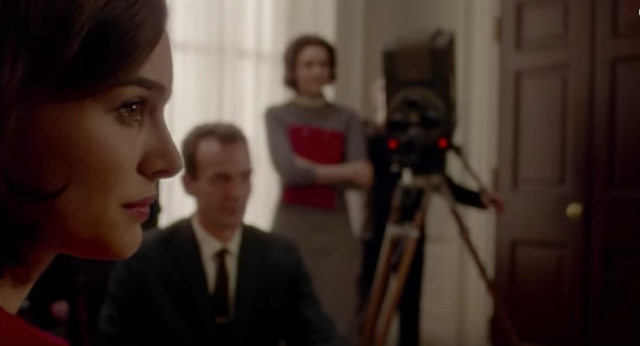“In short, there’s simply not
A more congenial spot
For happy-ever-aftering…”
-Camelot (1960)
Richard Burton’s somnolent voice echoes through Jackie twice: once, as Jackie Kennedy parades through the White House, soaking everything in before she leaves; and later, as her car drives the streets of Washington, and she sees her own mannequins unloaded from a truck in the morning light. It’s not the happy-ever-after she expected, but—as Pablo Larraín’s film argues—she was in charge of writing the next chapter. In the movie’s outer frame, Jackie invites an interviewer to her home and encourages him to write a hagiography of the Kennedys, editing his notes herself before she sends him off to tell their story.
Jackie is an unusual, elegiac biopic. The movie is about how private and public grief intersect, how beautiful mourning seems from a distance. Larraín shoots like a documentary. The film’s ratio is not wide, it looks grainy, and he mixes in real-life footage from Kennedy’s funeral procession. Larraín and Noah Oppenheim, the screenwriter, present a cold look at Jackie in the days after John’s death, centered around her demand for a lavish funeral spectacle that will properly honor a great man. There are exquisitely tasteful shots of the ornate rooms of the White House, with flashbacks to concerts and parties; but the dead-on camera shots and sharp lighting, slathered with a chilly string orchestra (composed by Mica Levi), lend her memories the feel of a horror movie. The ground is cracking beneath Jackie’s feet, and she must restore order and grace to a wounded world.
Natalie Portman ups her acting game as Jackie. From her hushed speech and careful poise, Portman suggests the First Lady was very carefully manufactured—until the assassination changed everything. Her Massachusetts accent (ninety percent there) feels studied, though that artificialness weirdly makes sense with her performance. There’s something very fragile beneath the veneer. We see it as she explains their father’s death to her children, or when she sits isolated and motionless on Air Force One, her pink suit streaked with blood. (And she pairs well with the always delightful Peter Sarsgaard as Bobby Kennedy.)
Given the time Jackie spends following Mrs. Kennedy’s every move after the president’s death, she remains impermeable. At times she’s so vulnerable; at others, she’s a Stepford Wife, repeating the Kennedy myth machine over and over until it starts to stick. Where is the boundary, Larraín asks, between her profile and the real woman beneath those gorgeous dresses, a woman who’s lost a husband and a president? Jackie is a mood piece more than a history lesson, and it sure is beautiful to watch.
Like Jackie, Kenneth Lonergan’s Manchester by the Sea explores how families cope after unexpected loss. From early reports, I expected two hours of unrelenting sorrow. And it’s fair to say the tearjerker plot wouldn’t be out of place in a Lifetime movie. But the movie manages to be even-handed: sometimes wrenching, often humorous, and usually balancing somewhere between the two.
Unlike Larraín’s heightened portrait of a woman in crisis, this story is more naturalistic. There aren’t easy resolutions for this Manchester family. Lonergan resists those by giving his characters space to grieve: usually in the smallest moments, working out details for the funeral (for example), struggling to pull through with humor and determination. Lonergan as director-writer knows how to mold strong performances, starting with Casey Affleck. As handyman Lee Chandler, who moves back to his hometown to look after his nephew when Lee’s brother dies, Affleck does career-making work. (Though, keep in mind, there’s this.) He’s got Massachusetts in his blood, and he’s convincingly rough-and-tumble, a working-class man who can’t shake the trauma he’s lived through. Even to his family, Lee is barely communicative, a well of self-loathing so tamped-down that the slightest crack in his voice is a rush of welcome feeling.
For all the good things about Manchester, it’s not always polished. Michelle Williams is a potent addition as Lee’s ex-wife, but her screen time is brief. In her one major scene, her character Randi ends up playing the role of apologist, assuaging Lee of his guilt. There must be more to this woman who’s as damaged as Lee, but she’s only written to reinforce his story. Then there’s all the time spent on teenagers not-so-secretly attempting to have sex. And the musical score hovers so forcefully, especially when it pours heavy classical music over one already-dramatic flashback.
The heart of the movie is Lee’s thawing relationship with his nephew Patrick (newcomer Lucas Hedges). Patrick thinks he’s hot stuff, man: he’s got two girlfriends, a band, and a boat. Hedges holds his own against Affleck, teaching the angsty adult to open up and start taking responsibility. The movie doesn’t make their relationship more than what it is, and their resolution is moving because it feels true. There’s real, honest hope for Lee and Patrick by the end; even the darkest winter eventually turns to spring.


[…] Larrain’s Jackie and Mike Mills’ 20th Century Women were two of the most critically acclaimed movies of the […]